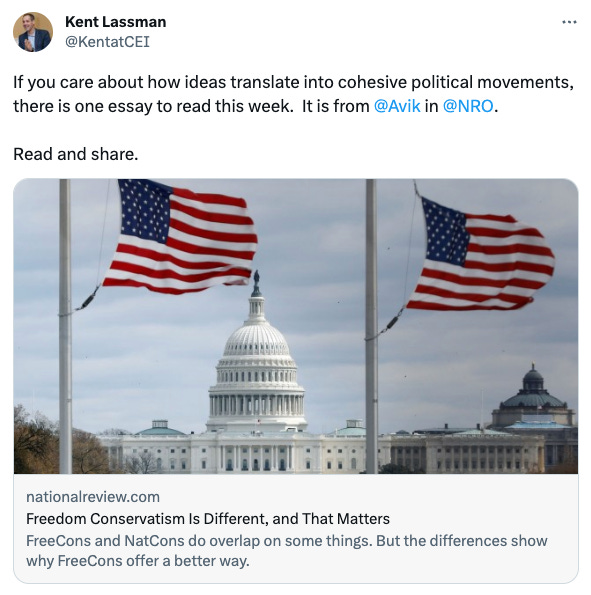Freedom Conservatism: A choice, not an echo
A preeminent historian of American conservatism weighs in on the Statement of Principles.
The Freedom Conservatism Statement of Principles continued to attract considerable attention last week.
Matthew Continetti, in a lengthy piece for The Washington Free Beacon, called the Statement “a meaningful and necessary intervention in the ongoing debate on the Right over political economy that deserves to be read and shared.”
Continetti, author of the The Right: The Hundred-Year War for American Conservatism, is one of the preeminent historians of American conservatism. “What’s remarkable about the document,” he continues, “is that it had to be written at all.”
Conservatives have placed freedom at the heart of their political program since the 1930s. They have resisted the encroaching control of centralized bureaucracies by appealing to the dignity of human life, the limited government of the Constitution, and the space that market economics provides for individual choice and competition.
The end of the Cold War led to the unraveling of this consensus, Continetti observes, culminating in the circumstances we find ourselves in today. But “for the rising generation that came of age during the Trump presidency, there has been no compelling alternative to National Conservatism,” the intellectual project of those who seek to reduce the role of individual and economic freedom in the conservative movement. “That is why Freedom Conservatism matters…after spending years on defense, conservatives who believe in political and economic freedom have drawn a line. They have taken a stand. They have offered the Right a choice, not an echo of Trump.”
Michael Brendan Dougherty, a signatory to the National Conservatism statement of principles, tweeted that “I could have signed [the Freedom Conservatism statement] honestly” as well—arguing in National Review that if you compare the Freedom Conservatism and National Conservatism statements, there was overlap between the two, and was puzzled by the need for Freedom Conservatism.
FreeCon signatory Avik Roy responded with his own piece in NR, agreeing that there was some overlap, but detailing what he sees as important political and philosophical differences between the two groups. “When FreeCons win this debate,” Roy concluded, “and NatCons ask us what time it is, we’ll have a simple answer: Once again, it’s morning in America.”
FreeCon signatory Quinn Hillyer, deputy commentary editor at The Washington Examiner, weighed in with his own take on the Statement. What FreeCons seek to conserve “is not some immutable natural order,” Hillyer wrote in the Examiner last week, “but, instead, the ideals of ordered liberty on which the United States was founded. Neither reactionary nor stultified, conservatism (correctly understood) allows for free men with free choice, working through free markets and freely formed cultural institutions, to build communities without heavy-handed government compulsion.”
After quoting key passages from the statement, Hillyer explained its purpose succinctly: “Consider Freedom Conservatism a flag of principle around which the wise and honest can repair.” Hillyer’s column also ran in the New Orleans Times-Picayune.
Follow FreeCon signatories on Twitter
The FreeCon Statement continues to attract new signatories. Among the leaders who’ve signed on in recent days are John Byrnes of Concerned Veterans of America, former U.S. House Majority Leader Richard Armey, Richard Lorenc of Iron Light, Mark Miller of the Pacific Legal Foundation, Daniel J. Mitchell and Brian Garst of the Center for Freedom & Prosperity, Judge Glock of the Manhattan Institute, Andrew Graham of the Alliance Defending Freedom, Peter St. Onge and Joel Griffith of the Heritage Foundation, Andrew Langer of the Institute for Liberty, Brooke Medina of the John Locke Foundation, Ashley Baker of the Committee for Justice, Soren Dayton of the Niskanen Center, Buzz Brockway of the Georgia Center for Opportunity, Ryan Wolfe of the Fund for American Studies, Jon Hartley from the Foundation for Research on Equal Opportunity, Williamson Evers from the Independent Institute, Pete Kaliner of WBT Radio, Frank Lavin of the Hoover Institution, Fernando Tesón of Florida State University, Andrew Spiropoulos of Oklahoma City University, Peter Gattuso of Connecticut College, and Gordon Jones of Mount Liberty College.
You can find the full list of signatories beneath the Statement by clicking here. And if you’re interested in following FreeCon signatories on Twitter, you can follow them as a group by following this Twitter List.
Are you involved in the liberty movement, and would like to sign onto the Statement of Principles? Fill out this brief form and we will review it. (If you’ve already filled out the form, thank you so much—we are actively reviewing the submissions that have come in.)



